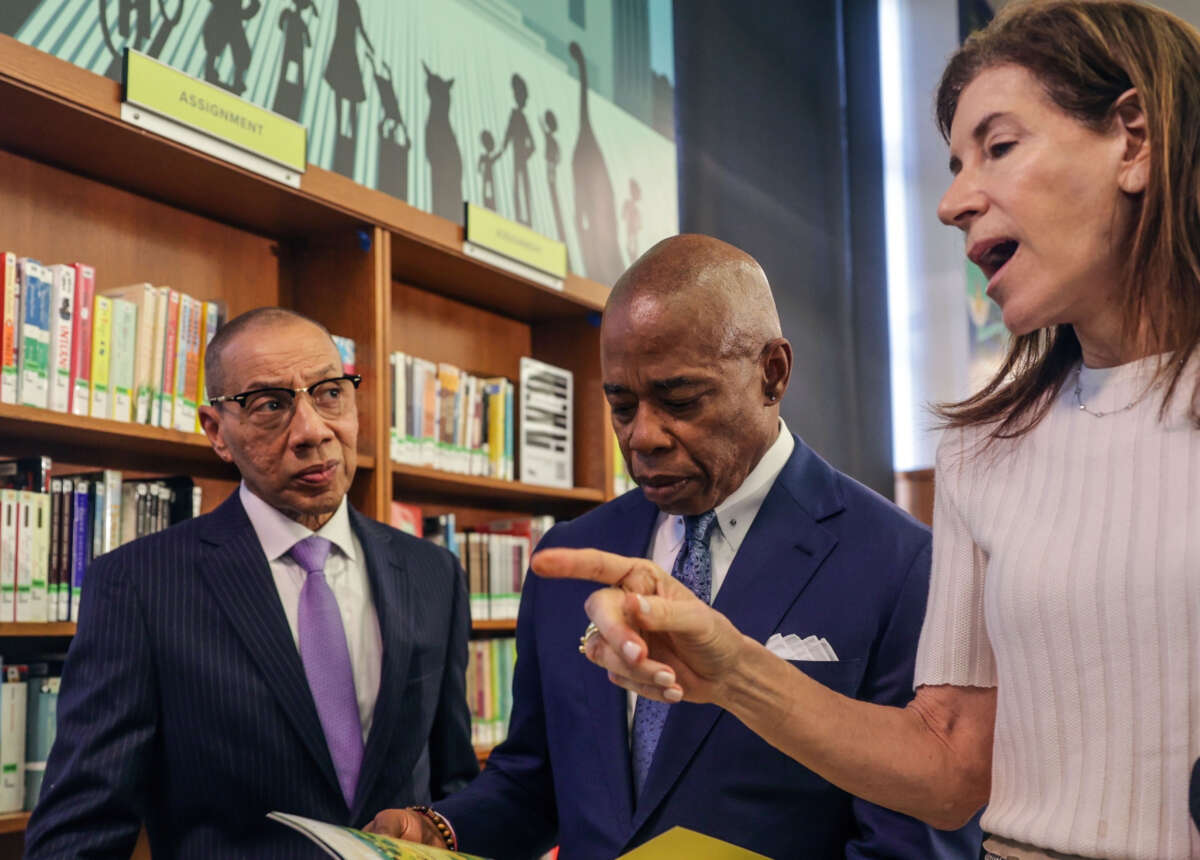Honest, paywall-free news is rare. Please support our boldly independent journalism with a donation of any size.
New York City public libraries are being forced to shutter services on Sundays after Mayor Eric Adams announced billions of dollars in budget cuts on November 16, removing hundreds of millions from schools and libraries.
“Brooklyn Public Library, Queens Public Library, and The New York Public Library regret to announce that as a result of mid-year budget cuts, we must eliminate seven-day service across the city, including ending Sunday service at the vast majority of branches that currently offer it,” library leaders told local media. .
The budget cuts are also expected to impact the public libraries’ ability to purchase new materials, organize new programming, and continue building maintenance and repairs. Mr. Adams has said that the city is making budget cuts in response to the rising costs of a migrant crisis.
“Hi, I’m a librarian. Here’s why this is really, really bad,” librarian Rachel Finston said on social media. “This won’t just create inaccessibility, it will also slow down everything.”
Finston explains that libraries closing, even one day of the week, not only impact’s New Yorker’s ability to access material, but also the ability of staff to process books. Additionally, the budget cuts will also likely impact the libraries’ weekend programming which may lead to cancellations of events.
“Librarians, particularly public librarians, will bear the brunt of this,” Finston said. “This screws over some of our best public servants.”
In the past year, libraries across the country have faced an unprecedented wave of attacks, including book bans, illegal firings, conservative defamation campaigns, police investigations into LGBTQ books, disinvestment, and far-right violence, putting library workers on the front lines of authoritarian attacks on democracy.
“Libraries are crucial social infrastructure,” librarian Jaime Taylor wrote for Truthout in 2022. [Libraries] are a site for the circulation of public goods such as books and films, but also tax forms, overdose-prevention medications such as Narcan, and COVID tests…[and] produce space for the public where anyone can use the bathroom, grab some computer time, sit down, stay warm in the cold and cool in the heat.”
Research shows that New Yorkers believe that libraries make a significant positive impact, are key to supporting progressive city initiatives, and need increased support. A survey found that 95 percent of respondents believe their communities and New York City would be impacted if the city enacted budget cuts that would result in a decline in hours, particularly on weekends. Sixty-five percent of library users would have limited access to books and the internet, and 73 percent of respondents said children and teens in their community would have few or no alternative free out-of-school programs.
“And like all social infrastructure, libraries are under attack from an organized right that knows well that the best way to crater public institutions is to relentlessly attack them until they become unusable, leading to their abandonment by everyone except those who have no other choice,” Taylor wrote.
Additionally, unhoused people rely on public libraries for resources and refuge, and they will be disproportionately affected by the limiting of library services. According to the Coalition for the Homeless, homelessness in New York City has reached the highest levels since the Great Depression of the 1930s. In September 2023, there were more than 87,907 unhoused people – including 31,510 homeless children – in the city. New York City’s public libraries are needed spaces where unhoused residents can freshen up, use the restroom, read a book or just come in to stay warm.
“I’ve seen people take advantage of computer literacy classes, financial literacy classes,” Shams DaBaron, an activist who collaborated with the mayor on housing proposals, told City Limits. “If you’re homeless, you don’t have access to a computer, you don’t have access to Wi-Fi for the most part. And so this is where that becomes that sort of very vital resource for us.”
On November 17, community leaders and elected officials protested the Adams administration’s citywide budget cuts in front of City Hall. “When New York is under attack. What do we do? Stand up and fight back,” demonstrators chanted.
“The administration’s approach of reducing budgets of all agencies broadly through additional cuts and a hiring freeze, along with inflicting cuts on our libraries, CUNY, and cultural institutions, is too blunt and not the prudent or sole choice,” City Council finance chair Justin Brannan, Speaker Adrienne Adams wrote in a joint statement.
Media that fights fascism
Truthout is funded almost entirely by readers — that’s why we can speak truth to power and cut against the mainstream narrative. But independent journalists at Truthout face mounting political repression under Trump.
We rely on your support to survive McCarthyist censorship. Please make a tax-deductible one-time or monthly donation.
